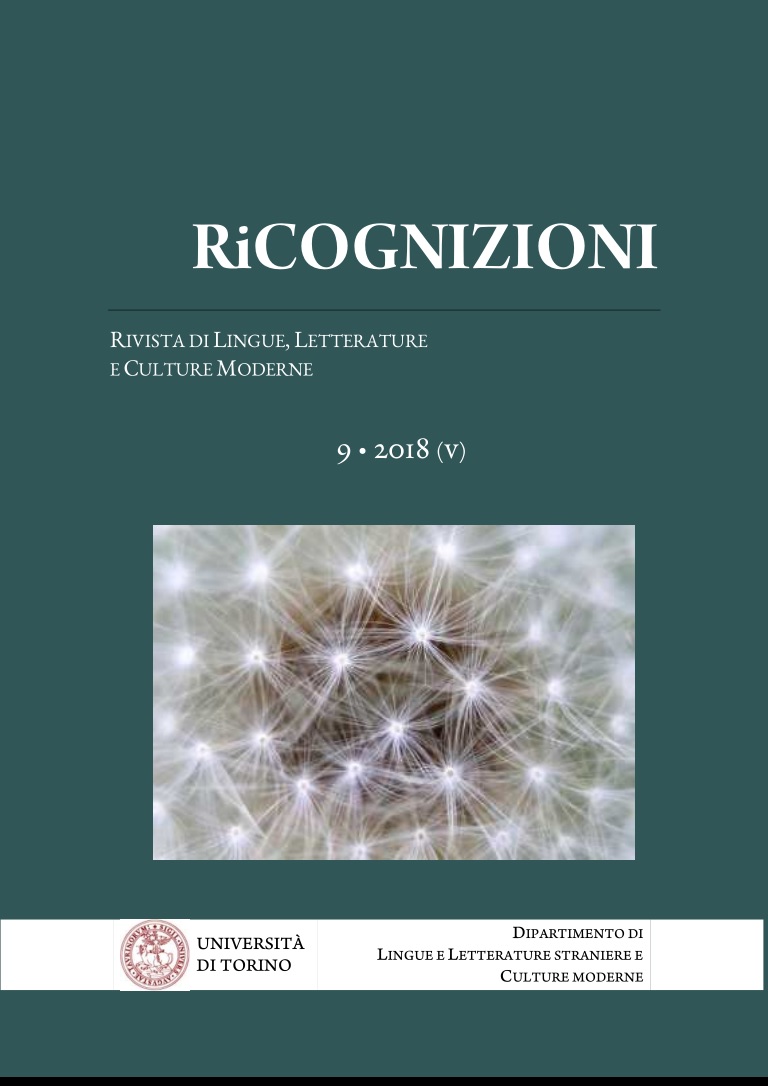E QUESTO IN SOSTANZA È TUTTO. L’AFASIA NELLE OPERE DI DANIIL CHARMS
DOI:
https://doi.org/10.13135/2384-8987/2330Palavras-chave:
Daniil Charms, aphasia, empty narration, formal and thematic analys, isResumo
This study focuses on the analysis of incommunicability in Daniil Charms’s poetics from the thematic point of view, as well as the philosophical and formal one. Thanks to his precision, the scientific language has been chosen to describe these narrative phenomena, avoiding the creation of equivocal neologisms. As a matter of fact, scholars can find a direct and precise connection between Charms’s stylistic choices and the scientific definition of aphasia elaborated by Aleksandr R. Lurija, years before the official codification of the neuropsychological disease. Aphasia has been investigated in a selected range of texts, that includes prose, poetry and drama, analysing the narrative technics and the characters portrait used by the author to fight the silence or to solve a creative block. However, the role of aphasia in Charms’s works doesn’t only show a compositional effect, but it also expresses a form of denounce of the author’s artistic consciousness. Furthermore, an important part of this study is focused on the function of words in human and object existence. In the end, what remains is the writer’s tenacious attachment to life through his voice.
Referências
Charms, D. (2008), Casi [1990], a cura di R. Giaquinta, Milano, Adelphi.
Charms, D. (1994), Daniil Charms (v 2 tomach), Moskva, AO “Viktory”.
Charms, D. (2001), Neizdannyj Charms. Polnoe sobranie sočinenii, Sankt-Peterburg, Akademičeskij proekt.
Charms, D. (2015), Polnoe sobranie sočinenii, Sankt-Peterburg, Azbuka.
Charms, D. (2000), Povesty. Rasskazy. Molitvy. Poemy. Sceny. Vodevily. Dramy. Stat’i. Traktaty. Kvasitraktaty, Sankt-Peterburg, Kristall.
Charms, D. (2002), Zapisnye knižki. Dnevnik. V 2 tomach, Sankt-Peterburg, Akademičeskij proekt.
Druskin, Ja. (1993), Vestniki i ich razgovory. Eto i to. Klassifikacija toček. Dviženie, in “Logos”, 4: pp. 91-101.
Borisenko-Svinarskaja, V. (2006), Lingvističeskie nuli u Daniila Charmsa, in Materjaly meždunarodnoj naučnoj konferencii “Daniil Charms: avangard i dejstvija i v otmiranii. K 100 – letiju so dnja roždenija poeta”, Belgrad, Izd-vo filologičeskogo fakul’teta: pp. 165-174.
Carpi, G. (2010), Storia della letteratura russa: da Pietro il Grande alla rivoluzione d’Ottobre, Roma, Carrocci.
Giaquinta, R. (2008), Daniil Charms: prosa senza poesia, in D. Charms, Casi, Milano, Adelphi: 309-336.
Ladavas, E., Berti, A. (2012), Neuropsicologia., Bologna, Il mulino.
Piccolo, L. (2007), Daniil Charms. Il volo e la vertigine, in “eSamizdat” (V) 1-2: pp. 135-151.
Šubinskij V–I. (2015), Daniil Charms: Žizn’ čeloveka na vetru [2008], Sankt-Peterburg, ACT (CORPUS).
Valieva, Ju. (2015), Materjaly k biografii G. N. Kacmana (sledstvennoe delo 1927 goda), in “Russkaja Literatura”, 1: pp. 206-230.
Vitale, S. (1979), Per conoscere l’avanguardia russa, Milano, Mondadori.
Žakkar Ž–F. (1995), Daniil Charms i konec russkogo avangarda [1991], Sankt-Peterburg, Sovremennaja zapadnaja rusistika.
Downloads
Publicado
Como Citar
Edição
Secção
Licença
RiCognizioni is published under a Creative Commons Attribution 4.0 International License.
With the licence CC-BY, authors retain the copyright, allowing anyone to download, reuse, re-print, modify, distribute and/or copy their contribution. The work must be properly attributed to its author.
It is not necessary to ask further permissions both to author or journal board.








